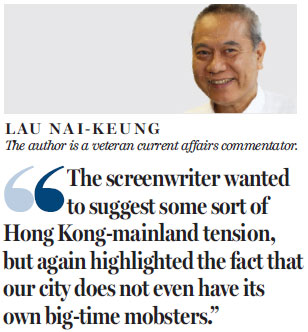Crime film offers an unrealistic view of HK-mainland relations
Updated: 2016-07-05 07:40
By Lau Nai-keung(HK Edition)
|
|||||||
After watching Trivisa, an action crime thriller that fictionalized three real-life notorious Hong Kong mobsters, Kwai Ping-hung (Kwai Ching-hung in the movie), Yip Kai-foon (Yip Kwok-foon) and Cheung Tze-keung (Cheuk Tse-keung), I am left with a sense of emptiness. The English title of the movie alludes to the Buddhist notion of "three poisons" (delusion, desire and fury) leading to suffering.
The time is spring 1997 - a backdrop brought to life through Jean Tsoi's detailed period design - and it was a time when then British-ruled Hong Kong could still brag about being economically superior to its mainland neighbor. But times are changing: Kwai Ching-hung hooks up with a pair of Chinese ruffians in a plot which will inevitably go awry; Yip Kwok-foon's pride takes a battering as he is taken advantage of and then humiliated by corrupt mainland officials; and Cheuk Tse-keung's self-absorbed search for Kwai and Yip also lead to his demise.

The international title's implicit message is that delusion (Cheuk), desire (Kwai) and fury (Yip) are the sources of Hong Kong's fall from grace after its return to Chinese sovereignty. But for the more casual Cantonese viewers who know the movie only as Syu Daai Ziu Fung, which loosely translates into destruction pursues the great, the evocative historical footage which bookends the main body of this film can be quite a stretch.
While the imaginative plot about a parallel universe where the three mobsters crisscrossed focuses on the characters more than anything else, you can't help but feel that perhaps a larger point is being made. Not that there must be a message, but there is indeed one in Trivisa, only we are not quite sure what it is. Edmund Lee ventured a guess in the South China Morning Post: "Ultimately, this is less a noirish thriller than it is a triple portrait of larger-than-life characters, who are all forced to renegotiate their brash and unruly criminal lifestyles in a dramatically changing political landscape."
Indeed, we feel almost sorry for the three mobsters. Yip tried to give up shooting an AK47 on Hong Kong streets, but his new career smuggling electronic goods across borders was made difficult by the corrupt mainland officials he must bribe. Police in Hong Kong could not touch Cheuk, but he was quickly apprehended on the mainland by the armed police force. "The journey of the characters and the stress and paranoia they feel as they know their lives are going to change immeasurably is enough to convey this sense of where everything started to go wrong," film critic Martin Sandison wrote.
Yes, we get this. Except when everything started to go wrong for the criminals, things supposedly started to go right for the rest of us in Hong Kong. But we do not feel that way watching the movie. Instead, we have a sense that we are perhaps in the same boat with the criminals.
Hong Kong has a long tradition of identifying with the bad guys. Triad society movies popular in the 1990s are the best example. In the 2000s, we had movies about undercover detectives and double agents that best illustrate our mixed allegiance - to our former colonial master and China.
Glorifying criminals once in a while does no harm, but Hong Kong has a persistent pattern of glorifying the triad society - another recent example is The Mobfathers, which uses a triad election as a metaphor for the pursuit of universal suffrage. Seen in this light, a police crackdown is a bad thing because behind the police is the SAR government, and behind that is the central government.
This is bad news for Hong Kong people - these criminals are not even "one of us". Kwai Ping-hung, Yip Kai-foon and Cheung Tze-keung were all born on the mainland. They partnered with criminals in Guangdong to commit criminal acts in Hong Kong; that's why they are known as the "Guangdong-Hong Kong soldiers". In gangster movies we often heard the term daai hyun zai. It means criminals from the mainland.
In Trivisa, Yip ended up being killed by the Hong Kong police because he recklessly fired his AK47 on the street after being called an "unsophisticated mainlander". The screenwriter wanted to suggest some sort of Hong Kong-mainland tension, but again highlighted the fact that our city does not even have its own big-time mobsters.
(HK Edition 07/05/2016 page8)